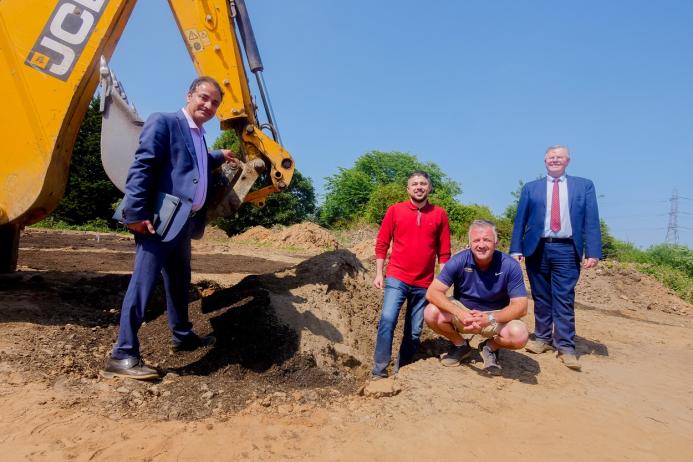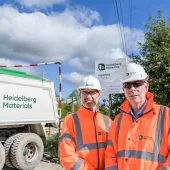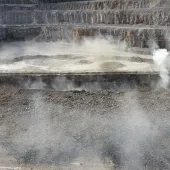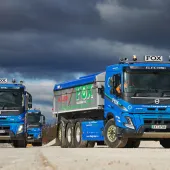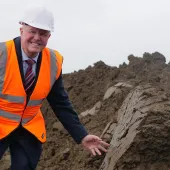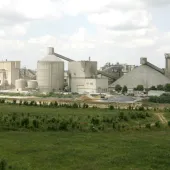Scott Bros committed to delivering carbon-neutral future
Teesside University study finds recycled clay could hold the answer to reducing CO2 emissions
THE North East could significantly reduce CO2 emissions by spreading blended clay on agricultural land, according to Teesside University scientists who are partnering with Scott Bros as part of a groundbreaking carbon sequestration study.
Writing in the ‘Journal of Cleaner Production’, the academics from the University’s School of Science, Engineering & Digital Technologies have calculated that applying a silicate clay-rich waste (SCRW) at a rate of 11.2 tonnes/ha could remove and store around 1.6 million tonnes of harmful carbon dioxide emissions from the atmosphere each year.
Recycling specialists Scott Bros are hosting the three-year research programme that seeks to identify which waste materials or blends of materials are optimum for carbon sequestration – the process that removes and stores the increased amounts of CO2 in the atmosphere to reverse global warming.
The blended SCRW is considered a rapid way of bypassing the natural weathering process involving silicate and carbonate rock, which is a natural control for climate change.
Rich in calcium and magnesium – both plant-essential nutrients, and with a particle size below 1.5mm – the waste clay is ideally suited for the carbonation process, offering substantial sequestration potential.
Some geologists suggest the last two ice ages were triggered by an excess weathering of rocks due to tectonic collision. This caused chemical reactions that absorbed higher levels of carbon dioxide, the compound which regulates the earth’s temperature.
Family-run Scott Bros donated a football field-sized site, near Haverton Hill, Stockton-on-Tees, where it created 30 pits filled with a combination of waste clay, activated filter cake, recycled aggregate, and compost.
The fine-grained SCRW, a low-value by-product, is produced at the recycling firm’s two wash plants, the most recent of which represented a £6 million investment in Teesside. They convert construction and excavation waste, which might otherwise go to landfill, into high-quality commercial sand and aggregate for the construction industry.
Scott Bros generate around 250,000 tonnes of SCRW materials per year, representing around 6.25% of England’s total non-hazardous construction and demolition waste.
The research with Scott Bros is being conducted by doctoral researcher Mardin Abdalqadir under the supervision of Dr Sina Rezaei Gomari, associate professor of research in energy and environmental engineering.
The pair have written the paper, 'Process-based life cycle assessment of waste clay for mineral carbonation and enhanced weathering: A case study for north-east England, UK ', together with Professor David Hughes and Ahmed Sidiq from Teesside University, and Feysal Shifa from Scott Bros.
Mr Abdalqadir said: ‘The results indicate that the application of SCRW on agricultural land in north-east England could capture a substantial portion of the region's CO2 emissions, equivalent to a significant reduction in the UK's total emissions.’
Dr Rezaei Gomari added: ‘To fully realize its potential – field-level investigations, robust monitoring systems, and comprehensive assessments are essential to understand its impact on soil properties, water management, and crop growth.
‘This innovative approach emphasizes the significant carbon capture potential of waste materials like SCRW, compared to natural rock. It has promising implications for cleaner production technologies and sustainable agricultural practices.’
Scott Bros are also researching methods to convert the clay into ‘recycled’ bricks and has produced several prototypes, which have attracted interest from major UK housebuilders.
Peter Scott, a director at Scott Bros, commented: ‘I’m confident that SCRW can contribute towards achieving increased resource efficiency while playing a major role in mitigating climate change.
‘Scott Bros is proud to be supporting this Teesside University research which is a promising step toward reducing carbon emissions and demonstrates the benefit of taking an innovative approach in the quest to create a more sustainable future.’
Fellow director Bob Borthwick added: ‘There were four million tonnes of non-hazardous construction and demolition waste in the UK that remained unrecycled in 2020. This study has the potential to completely turn that situation around and provide a huge boost to the circular economy.’

